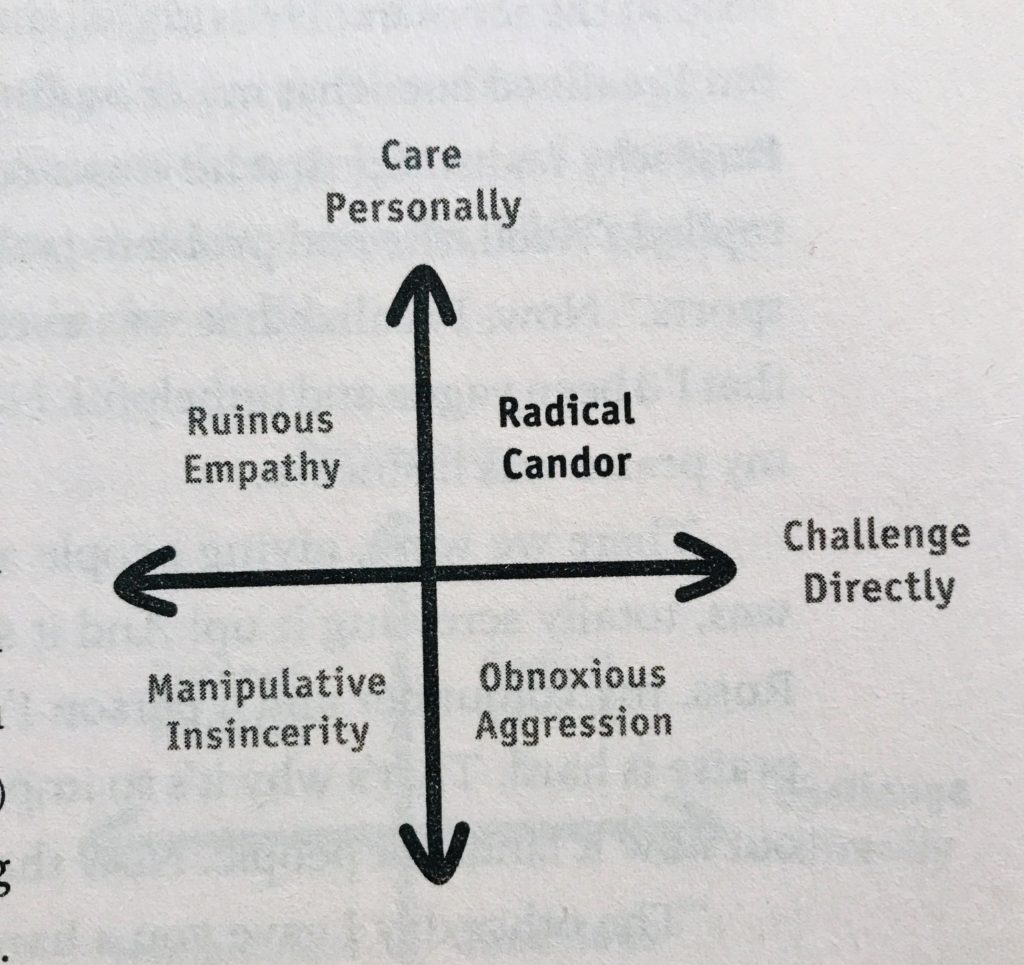Radical candor is a way of communicating with people at work that focuses on care and communication. It is that feeling when someone you trust genuinely supports you and expresses praise when you experience success. Yet, that same trusted person holds you accountable when you aren’t doing the things that lead to success.
If you’ve played organized sports, taken music lessons, or attended school, then you’ve likely experienced a range of support from your teachers and coaches. Have you ever had a leader who pushed you to get better? A leader who helped you build new skills while also sharing your hard-earned victories? This combination is the main idea behind radical candor.
I think I get it… but can you define radical candor for me?

Quite simply there are two facets that make up radical candor. The first is caring personally for each individual employee. The second is challenging directly. radical candor falls squarely in balancing these two key functions.
In order to practice radical candor as a boss, you must check both boxes with each of your direct reports. One without the other leads to extremes that are either obnoxious or disingenuous. Lastly having neither is quite possibly the worst of all the possibilities.
When I was leading a team of new sales representatives at Gartner, I wish I’d have understood radical candor. Looking back, I genuinely cared about my people but struggled to challenge directly. I often struggled between being a supportive boss and being able to effectively upskill my team through radically candid feedback.
The philosophy behind radical candor
Build Real Relationships
As a manager, you can take some simple steps to implement a radical candor with your team. The first key is to build real relationships with your team. This means not just discussing work-related matters, but discussing other interests. Each member of your team will be different and building a relationship takes time. As a leader, you should be curious and open up about yourself.
Provide Guidance and Feedback
The second key is focusing on guidance and feedback. As a manager, your role isn’t to do your work for your employees, but enable them to be successful. Managers may struggle with not wanting to be a micromanager on one hand. Yet on the other not being so hands off as to fail to support your team. When looking at guidance and implementing radical candor first focus on yourself. Ask your team for feedback and encourage radical candor about where you can improve. Invite, reward, and act on the feedback your employees give. This will provide the groundwork for you to do the same.

Building a Team
The third key is building a team. The best sports teams are composed of a mix of players. This may include a superstar or two but mostly consist of rock stars who consistently perform. Superstars are the employees who are on an incredible growth trajectory and focused on the next promotion. Rockstars, on the other hand, are content in their roles and focused on performing at a high-level. Building a team of only superstars is no way to build a strong team. You must encourage and support both your superstars and rockstars. The other nuance is that people will move in and out of those buckets during various times in their careers. Thus having radically candid relationships built on trust are so important.
Results
The last key is results. If you’ve built a collaborative team focused on providing quality guidance consistently, the results will follow. The ultimate goal of radical candor is to do more as a team than each individual. The sum of the parts is greater than each siloed individual. Ultimately radical candor is about teams achieving great things together.

What next…
Kim Scott lays out numerous strategies, stories, and tactics for implementing radical candor in the workplace. The book goes into great detail about the philosophy and how to effectively utilize meetings to accomplish goals. There are fantastic frameworks for approaching radically candid conversations and ways to implement radical candor.
I encourage you to read the book yourself if you find the idea of radical candor interesting. The tools and tips are wonderful for both first time managers and seasoned managers. You’ll walk away with actionable insight and new perspective.
In addition, I encourage you to read about other management philosophies below.
The Hard Thing About Hard Things – What they don’t tell you when you become CEO.
High Output Management – Classic principles from Andy Grove the former CEO of Intel.
Lean Startup – Classic philosophy about how technology companies can grow quickly.
The Art of Cultivating Grit – Angela Duckworthy studied Grit and how you can cultivate it in yourself and your team.
Business Building Tools
For technology companies looking at strategies to scale check out – Crossing the Chasm focused on moving from early adopters to mainstream users, Growth Hacking Tools strategies and tactics to help scale, Influencer Marketing how you can use this underutilized strategy to grow, and Blue Ocean Strategy creating new markets without competition.
Other areas of interest – Product Development, Raising Venture Capital, Hiring Great Talent.

[…] When it comes to firing there are various different philosophies. One important piece is that it must be clear that it isn’t working out. You should always document your conversations and communications about an employee’s quality of work. There must be an opportunity for an employee to improve and proper guidance to help them succeed. You’ve spent a lot of resources to hire and train this individual. Therefore you want to ensure you’ve given them every chance to succeed. If you struggle with providing quality feedback or having difficult conversations, check out Radical Candor. […]
[…] that you’re gonna get a lot of really good positive feedback you’re gonna get a lot of constructive criticism. You’ll also get a lot of suggestions like “oh why would you do this? Why did you do that?” […]
Comments are closed.